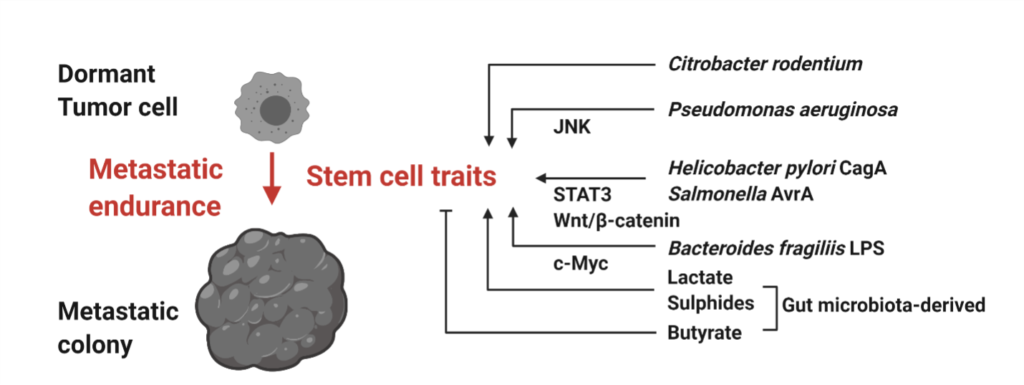Does the Gut Microbiome Influence the Metastatic Cascade of Cancer?
In a recently published perspective article, we reviewed novel and unresolved concepts related to the biology of cancer metastasis, that may be reasonably connected and resolved through the study of alterations in the gut microbiome.
Proposed Mechanisms of Interaction
There are unanswered questions in the field of cancer metastasis that we propose could be answered by looking at the impact of the intestinal microbiome in health and disease states. The questions we proposed in this review, with regards to the effects of intestinal dysbiosis in cancer metastasis include:
- Could gut microbiota-derived signals or cues trigger the break in metastatic dormancy?
- Are there patient specific features regulating the premetastatic niche and are these modulated by gut microbiota?
- Could the gut microbiome interaction with tumor cells through epigenomic/epigenetic regulation help predict metastatic proclivity?
There are numerous studies that have reported on the association between intestinal dysbiosis and the development of cancer, and the importance of the microbiome in the development of cancer. In spite of all of the evidence linking the intestinal microbiome with cancer, there remains a paucity of studies evaluating the effects of the microbiome and its product on the development or treatment of metastasis. In this paper we asked if the host contribution to trigger and regulate the cellular events of metastasis may involve the gut microbiota. As we propose this new research agenda, we hypothesize that modulation of the metastasis microenvironment resulting from gut microbiome alterations, influences the metastatic cascade.

Figure 1: Gut microbiota derived metabolites and bacterial components can affect the intracellular signaling pathways of cancer cells, which could trigger entry and exit from dormancy, influence metastatic endurance, and contribute to changes in the premetastatic niche. Created with BioRender.com
Gut Microbiota-Derived Metabolites and Possible Linkage to Metastasis
It has been proposed that the effects of specialized metabolites may explain current knowledge gaps in linking the gut microbiota to biological host mechanisms in various disease states, including cancer. We now propose that these or other metabolites may influence metastasis progression.
The questions that will need to be addressed in future studies include:
- What are the cellular phenotypes involved and how are they regulated?
- What are the bioactive metabolites produced in dysbiosis, and what are their targets?
- Are there metabolites from the microbiota that are involved in establishing a premetastatic niche, triggering the end of dormancy, or promoting a tumor microenvironment interaction?
- Are there secreted bioactive metabolites that contribute to vasculogenesis, angiogenesis, or epigenetic regulation of metastatic tumor cells?
Originally published in: Clinical Oncology Journal in July 2021.
Study Authors: Drs. Kevin F. Mallery; Yongbin Choi; Sarah Kenney; Andrew Y. Koh; Chand Khanna